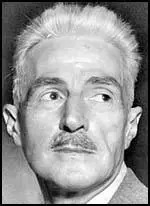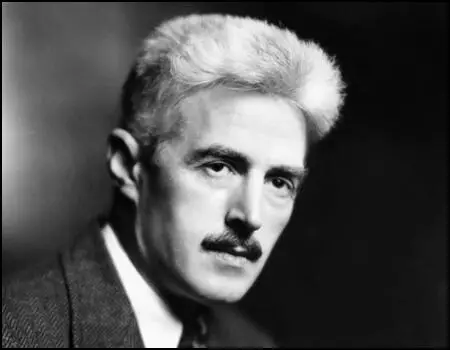Dashiell Hammett

Dashiell Hammett, the son of a clerk, was born in St. Mary's County, Maryland, on 27th May, 1894. He left school at 13 and was employed in a variety of different jobs before joining the Pinkerton Detective Agency in 1915.
Lillian Hellman later claimed that Hammett turned down an offer of $5,000 to "do away with" Frank Little while working in Montana. Little, a leading figure in the Industrial Workers of the World was lynched in August 1917. Hellman recalled: "Through the years he was to repeat that bribe offer (to kill Frank Little) so many times, that I came to believe, knowing him now, that it was a kind of key to his life. He had given a man the right to think he would murder, and the fact that Frank Little was lynched with three other men in what was known as the Everett Massacre must have been, for Hammett, an abiding horror. I think I can date Hammett's belief that he was living in a corrupt society from Little's murder."
Disgusted by the behaviour of the Pinkerton agents, Hammett joined the United States Army during the First World War. However, he contracted tuberculosis and spent some time in army hospitals. While in hospital Hammett met and married a nurse, Josephine Dolan. The couple had two daughters, Mary Jane (1921) and Josephine (1926). However, the couple eventually parted abut Hammett continued to financially support his wife and daughters. In 1929 he began an affair with Nell Martin, the author of several stories that had been made into movies. This included The Adventures of Mazie (1925), The Vanishing Armenian (1925), High, But Not Handsome (1926) and Little Andy Looney (1926).
Hammett's work with the Pinkerton Detective Agency provided material for detective stories that he published in the Black Mask Magazine. His first novel, Red Harvest, appeared in 1929. This was followed by The Dain Curse (1929) and The Maltese Falcon (1930), a novel that introduced the fictional detective, Sam Spade. After the publication of The Glass Key (1931) and The Thin Man (1932), Hammett was invited to Hollywood where he worked on several scripts.
During this period he began living with Lillian Hellman and over the next few years the couple became involved in the campaign against the growth of fascism in Europe. They joined with other literary figures such as Clifford Odets, Michael Gold, John Dos Passos and Ernest Hemingway in supporting the Popular Front government during the Spanish Civil War. In 1937 he joined the American Communist Party.

On 26th May, 1938, the United States House of Representatives authorized the formation of the Special House Committee on Un-American Activities. The first chairman of the Un-American Activities Committee (HUAC) was Martin Dies. The original intention of the HUCA was to investigate both left-wing and right wing political groups. In a statement made on 20th July 1938, Dies claimed that many Nazis and Communists were leaving the United States because of his pending interrogations. The New Republic argued that the right-wing Dies, who it described as "physically a giant, very young, ambitious, and cocksure" would target those on the left. It was no surprise when Dies immediately announced that he intended to investigate aspects of the New Deal that had been established by Franklin D. Roosevelt.
J. Parnell Thomas, a member of the HUCA, described the Federal Theatre Project as being "infested by radicals from top to bottom" and on 26th July, 1938, called for Hallie Flanagan to answer questions before the committee. Flanagan immediately went on the attack arguing that: "Some of the statements reported to have been made by him (Parnell Thomas) are obviously absurd... of course no one need first join or be a member of any organization in order to obtain employment in a theatre project."
Hammett was one of those who came to the defence of Flanagan. In October 1938 he argued: "We indignantly reject these irresponsible attacks. At this crucial time when the cooperation of all democratic forces is so essential, this attack throws a very dubious light on the character of the whole Dies investigation. It emphasizes the need for the greatest alertness on the part of all democracy-loving American people."
Hammett was involved in the screenplay for Woman in the Dark (1934), Mister Dynamite (1935), The Glass Key (1935), Satan Met a Lady (1936), After the Thin Man (1936), Another Thin Man (1939), Shadow of the Thin Man (1941) and The Maltese Falcon (1941).
In 1942, after the bombing of Pearl Harbor, Hammett enlisted in the United States Army. As a victim of tuberculosis he was not fit enough for active service and so he was sent to the Aleutian Islands, where he edited an army newspaper, which people complained was too pro-Russian.
After the Second World War Hammett decided to concentrate on politics rather than writing. On 5th June 1946 he was elected President of the Civil Rights Congress. Later that year a bail fund was created by the CRC to help those arrested for political reasons. The three trustees of the fund were Hammett, Robert W. Dunn, and Frederick Vanderbilt Field.
On 20th July, 1948, Eugene Dennis, the general secretary of the American Communist Party, and eleven other party leaders, including William Z. Foster, Benjamin Davis, John Gates, Robert G. Thompson, Gus Hall, Benjamin Davis, Henry M. Winston, and Gil Green were arrested and charged under the Alien Registration Act. This law, passed by Congress in 1940, made it illegal for anyone in the United States "to advocate, abet, or teach the desirability of overthrowing the government". The CRC fund was used to bail thses men.
Hammett testified on July 9, 1951 in front of Judge Sylvester Ryan. During the hearing Hammett refused to provide the list of contributors to the bail fund. On every question regarding the CRC or the bail fund, Hammett took the Fifth Amendment. Hammett was then called to appear before the House of Un-American Activities Committee. Hammett agreed to talk about his own involvement with radical groups, but was unwilling to give names of his comrades. He was found guilty of contempt of Congress and as well as being blacklisted, was sent to prison for six months.
Dashiell Hammett died in New York City on 10th January, 1961.
Primary Sources
(1) Lillian Hellman, Scoundrel Time (1976)
Through the years he was to repeat that bribe offer (to kill Frank Little) so many times, that I came to believe, knowing him now, that it was a kind of key to his life. He had given a man the right to think he would murder, and the fact that Frank Little was lynched with three other men in what was known as the Everett Massacre must have been, for Hammett, an abiding horror. I think I can date Hammett's belief that he was living in a corrupt society from Little's murder.
(2) Diane Johnson, The Life of Dashiell Hammett (1984)
It was in a boardinghouse in Butte, Montana, in 1917 that the owner, Mrs. Nora Byrne, was awakened one night by voices in the room next to hers, room 30, men's voices saying there must he some mistake here, and then feet in the hall, then men at her door, pushing it open, and Mrs. Byrne, having jumped out of bed, held her door with all her strength as some men with guns pushed it in anyway. They held the gun on her, saying, "Where is Frank Little?" and she told them. Then they went away again, and kicked down the door of room 32 and went in and woke the man sleeping there, who made no outcry or objection and demanded no explanation. Because he had a broken leg, they had to carry him out.
Then, in the morning, he was found hanging from the trestle with a warning to others pinned to his underwear. Some people said his balls had been cut off. The warning came from the Montana vigilantes, though it was hard to see what the citizens of Montana stood to gain from the death of this poor man. Only the mine owners stood to gain from the death of this agitator, a Wobbly. Wobblies were stirring up a lot of trouble among the miners at Butte.
"These Wobblies," said the mine owner's lawyer a few days later, "snarling their blasphemies in filthy and profane language; they advocate disobedience of the law, insults to our flag, disregard of all property rights and destruction of the principles and institutions which are the safeguards of society." He was trying to show that Mr. Little had brought his lynching on himself. "Why, Little, the man who was hanged in Butte, prefaced his seditious and treasonable speeches with the remark that he expected to be arrested for what he was going to say." Perhaps he had not expected, however, to he hanged, but what were decent Americans to do with such rascals?
The mine owner's lawyer, noticing no contradiction, inconsistency or irony, proclaimed that the Wobblies "have invariably shown themselves to be bullies, anarchists and terrorists. These things they do openly and boldly," unlike (he did not add) all the decent American vigilantes who came masked by night. The young Hammett, in Montana at the time, noticed the ironies and inconsistencies with particular interest because men had come to him and to other Pinkerton agents and had proposed that they help do away with Frank Little. There was a bonus in it, they told him, of $5,000, an enormous sum in those days.
Hammett's inclinations had probably always been on the side of law and order. His father had once been a justice of the peace and always went to the law when necessary with confidence, for instance, when his buggy was damaged by the potholes on the public road; and he worked for a lock-and-safe company, and at other times as a watchman or a guard. There was thus in the family a brief for caring about the property of others, putting oneself at risk so that things in general should be safe and secure.
But at some moment - perhaps at the moment he was asked to murder Frank Little or perhaps at the moment that he learned that Little had been killed, possibly by other Pinkerton men - Hammett saw that the actions of the guards and the guarded, of the detective and the man he's stalking, are reflexes of a single sensibility, on the fringe where murderers and thieves live. He saw that he himself was on the fringe or might be, in his present line of work, and was expected to be, according to a kind of oath of fealty that he and other Pinkerton men took.
He also learned something about the lives of poor miners, whose wretched strikes the Pinkerton people were hired to prevent, and about the lies of mine owners. These things were to sit in the back of his mind.
And just as he learned about the lot of poor miners, and about the aims of trade unions, so at some point he learned about the rich. He saw their houses - maybe as a Pinkerton man, or maybe it was back in Baltimore that he noticed the furniture and pictures in rich people's houses, different from the crowded parlor on North Stricker Street, or from the boardinghouses and cheap hotels he stayed in.
(3) Dashill Hammett, chairman, Motion Picture Artists Committee (October 1938)
We indignantly reject these irresponsible attacks. At this crucial time when the cooperation of all democratic forces is so essential, this attack throws a very dubious light on the character of the whole Dies investigation. It emphasizes the need for the greatest alertness on the part of all democracy-loving American people.

